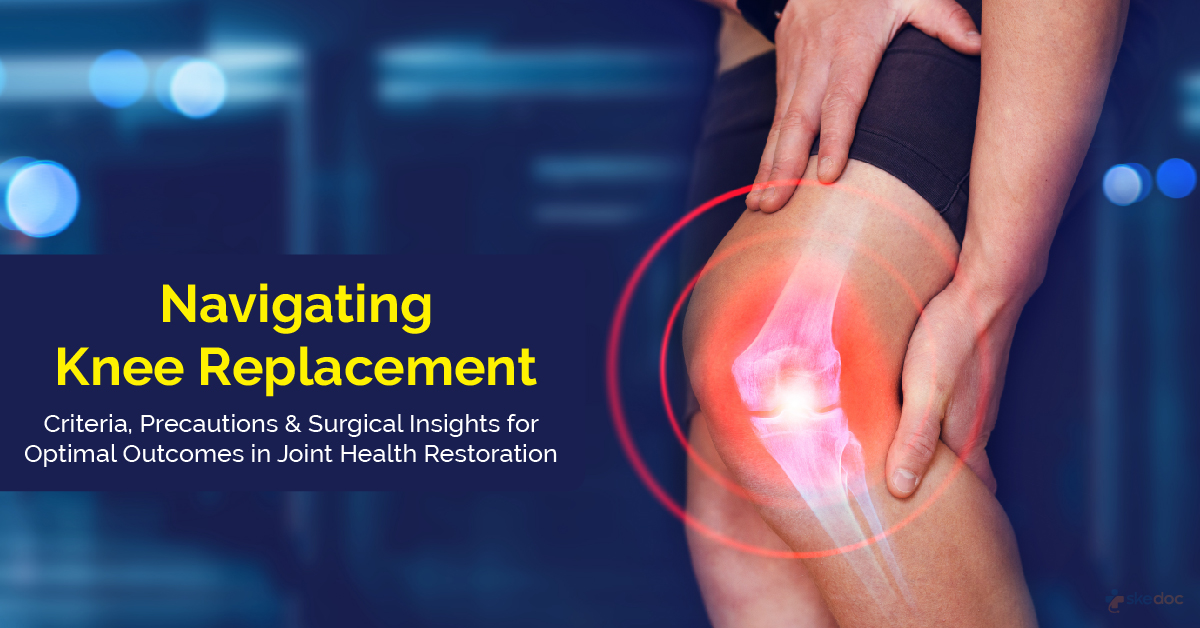Allergy
Blood Diseases
Bone & Joints
Brain
Cancer
Child Care
Cosmetic Surgery
Diabetes
Endocrinology
ENT
Eye
Gen Medicine
General Surgery
Heart
Kidney
Lifestyle
Liver & Digestive
Lung
Men’s Health
Mental health
Physiotherapy
Rheumatology
Skin and hair
Sleep Disorders
Spine
Transplant
Women Health
Thyroid
Vascular Surgery
Knee Replacement

What is a Knee Replacement?
Knee Replacement, also known as Knee Arthroplasty, is a surgical procedure performed to remove the damaged bone and cartilage around the knee to restore normal function and relieve pain. The knee joint is replaced with an artificial joint (prosthesis) made of metal alloys or high-grade and wear-resistant plastic.
Is knee replacement an elective or an emergency procedure?
Knee Replacement is an elective procedure.
Types
The type of knee replacement surgery and the type of knee prosthesis to be used is determined considering the severity of the damage, weight, age, activity level, knee size and shape, and an individual's health condition.
Knee replacement can be performed either as:
- Partial Knee Replacement: It refers to repairing and replacing only the damaged compartment of the knee.
- Total Knee Replacement: It refers to repairing and replacing all three knee compartments.
Indications
The reasons for performing replacement surgery are:
- Osteoarthritis
- Rheumatoid arthritis
- Psoriatic arthritis
- To relieve joint pain from a meniscus tear, ligament tear, and cartilage loss
- To restore joint function
- To correct knee deformities
- Sustaining a trauma to the knee joint or knee bone
Contraindications and Risk Factors
Knee Arthroplasty is not recommended in the following conditions:
- Ongoing local or widespread infection
- Nonfunctioning extensor mechanism
- A disease of peripheral blood vessels or nerves
- Other medical conditions that can put an individual at risk of complications or death during or after surgery
Investigations before the procedure
Tests that are performed before surgery are:
- Weightbearing x-rays of both knees in AP, lateral, and 30 degrees of flexion
- Complete blood count
- Electrolytes
- Blood clotting test, APTT, and PT
- Chest x-rays
- Electrocardiogram (ECG)
- A blood cross-matching test is done for transfusion purposes
Preoperative Advice
Instructions before a Knee Replacement surgery:
- One month before surgery, supplemental iron is prescribed to increase hemoglobin levels in the blood
- Blood thinner medications such as aspirin and warfarin are stopped a few days before the surgery to reduce bleeding
- No oral intake after midnight on the night before surgery
- Antibiotics are given before, during, and after the surgery to prevent infection
- Tobacco use can delay the healing process. Smoking is advised to be discontinued before surgery
Intraoperative Details
- Anaesthesia: Knee Replacement surgery can be done under general or local anaesthesia.
- Duration: The procedure can take up to two hours.
Description of the procedure
An IV line is inserted into the arm for proper hydration. A urinary catheter is inserted to empty the bladder. Excess hair on the knee is shaved. Heart rate, blood pressure, breathing, and blood oxygen levels are continuously monitored during the surgery. The knee is bent, and the skin is cleaned with an antiseptic solution. A 6 to 10 inches long incision is made on the knee joint to expose all the joint surfaces. The damaged parts of the knee are repaired and removed. A prosthesis is placed in the knee joint. Before closing the incision, the knee is bent and rotated to ensure function. The incision is closed with sutures. A sterile bandage is applied to the surgical site.
Postoperative Details
Postoperative instructions are as follows:
- Pain medications are prescribed for pain and discomfort.
- The surgical site should be kept clean and dry.
- Blood thinners and compression boots are used to reduce swelling and clotting.
- Follow-up as scheduled by the physician for removal of the stitches.
Role of Diet/ Exercise/ Lifestyle changes
Aftercare instructions for Knee Replacement surgery:
- Pain medications are to be continued as directed by the physician to relieve pain and discomfort.
- Physical therapy or a home exercise program is required to restore the joint range of motion and regain muscle strength.
- Diet as directed by the physician
- Assistive walking devices like front-wheel walkers, crutches, or canes are used for walking.
- Activities like climbing stairs or standing too long should be limited or avoided for a few weeks.
- A raised toilet seat should be used after knee surgery.
- Ice packs around the surgical site are applied to reduce swelling.
- The rest should be taken in between activities.
- Exercises like knee bending and stretching, knee straightening, ankle pumps, circles, etc., should be followed to improve strength and range of motion.
- Activities like jogging, jumping, skiing, etc should be avoided.
Complications
- Infection
- Swelling, redness, and pain around the surgical site
- Bleeding or any other drainage from the surgical site
- Formation of blood clots in the legs
- Injury to the surrounding nerves and blood vessels
- Numbness or tingling of the leg
- Heart attack and stroke
- Prosthesis parts can become loose and wear off
- Pain may not be reduced even after surgery
- Inability to restore complete joint function even after surgery
Prognosis
The overall prognosis of Knee Replacement surgery is good. Pain relief would be achieved along with a better quality of life. This surgery can last for more than 15 to 25 years.
Indications for hospitalization if required
Knee Replacement surgery requires hospitalization for two to three days depending upon an individual's stability and other medical conditions.
Suggested clinical specialist/ Department to consult for the procedure
Orthopaedic surgery
Was this article helpful?
YesNo
Comments





